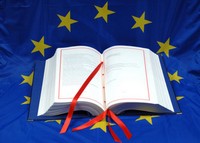Treaty of Lisbon Opens New Era in EU Cooperation
"A new era of European cooperation begins today. With the Treaty of Lisbon, EU citizens get a union that can meet the demands of the 27 member states for transparency, democracy and efficiency, a union that can better meet the challenges of globalization," Reinfeldt said in an article published on the Swedish EU presidency website.

"EU cooperation becomes more efficient, more active, and our international action becomes more coherent," said Reinfeldt, whose country currently holds the rotating EU presidency.
He said the EU could better prevent conflicts and also render peace support operations more effective with the High Representative for Common Foreign and Security Policy (HR) in place.
The newly appointed HR, Catherine Ashton from Britain, will have a key role in formulating and implementing foreign and security policy, Xinhua reports.
Jerzy Buzek, President of the European Parliament said, "The Treaty of Lisbon represents an increase in democracy and efficiency in the European Union." He added, "The Treaty gives a huge boost to the powers of the directly-elected European Parliament. The Lisbon Treaty is a tool not the aim. The Treaty gives the EU a set of tools to tackle more effectively the key concerns of citizens."
The treaty's most important innovations include the creation of a permanent president of the European Council and a new EU foreign minister who will head a large diplomatic office.
European leaders selected Belgian premier to be the EU's first permanent president. EU trade commissioner Catherine Ashton from the UK lands the foreign policy spot.
After nail-biting negotiations at a council meeting headed for the history books, the decision on Belgian prime minister Herman Van Rompuy and commissioner Ashton was unanimous , AHN reports.
It was also reported, the treaty, drawn up to replace the aborted EU constitution, is designed to boost the bloc's global standing and streamline the institutions which represent half a billion people in 27 countries.
"The Treaty of Lisbon puts citizens at the centre of the European project," European Commission President Jose Manuel Barroso said in a statement.
Now "we can focus all our energy on delivering what matters to our citizens," he added, in reference to the years of institutional navel-gazing which ended with the treaty coming into effect.
The treaty will also reinforce the EU parliament's role and cut the number of national vetoes on European policy, AFP reports.
Subscribe to Pravda.Ru Telegram channel, Facebook, RSS!





